#< some discussion
Explore tagged Tumblr posts
Text
the great (horrifying) thing about supernatural horror involving little kids is the underlying thread of helplessness that isn't really present with adult characters/stories
like with Skinamarink, we could debate whether the happenings of the film are physically "happening" or whether they're a metaphor for something more realistic (like child abuse/neglect), but at the end of the day the result is the same: these kids are 100% completely powerless
to a kid, an omnipotent god-entity is at the same level of confusing and powerful as a particularly cruel adult. without any way to call for help (or any way to get adults to listen to them), they're fucked either way. this is especially true if the kid is too young to have really internalized "rules of reality" yet-- they don't know how the world is "supposed" to work yet, so they prolly won't pick up on subtle spacial/metaphysical fuckery. they just know that they're scared and hurt and confused, and no one is around to help them
it rly puts into perspective the kinda world kids are forced to navigate, esp when we don't take the time to meet them at their level or care to listen to them. and, alternately, I think it also serves as an interesting way to view cosmic horror-- entities that often overlook the gaps in our perspectives and don't (or maybe can't) properly explain their motives or actions, and have the power to wreak devastating trauma on us if they have the inclination
#shut up ashley#horror#skinamarink#child abuse#< some discussion#other good examples: Among the Sleep. Papo and Yo#tho those are uh. unambiguous metaphors lmao. point still stands tho
264 notes
·
View notes
Text
"internet historian's alt-right anyways" "great day to have never liked james somerton" "never even heard of illuminaughtii before this lol"
that's great buddy but don't go around thinking you're immune to this. if you're not looking for plagiarism, you likely won't notice it unless its egregiously obvious. hell, you've probably consumed plagiarized content without even realizing it. even hbomb pointed out that these people disguised what they presented pretty well as long as you didn't try and dig deeper. don't come away just thinking of this as a callout piece, take this as an important lesson about vetting your sources. if googling scripts in quotes was enough to expose the original, we should all start doing that shit!!
edit: it got a little too doomer-y a little too fast so one quick addition
this is hbomb's curated playlist of queer creators, many of whom were victims of plagiarism
this is producer kat on reddit calling for any more plagiarism discoveries and for queer content creators to be uplifted
please take some time to uplift these creators and recommend any you know! if you can help uncover more of the original creators whose work was lifted that would be great too :)
UPDATE- From Hbomb's twitter: "We're in the process of cataloguing everyone James Somerton plagiarised and finding their contact information. Which is quite a task, so to help us out: If you see this and happen to be one of the people Somerton stole from, please email us at [email protected]"

edit 2:

#hbomberguy#james somerton#illuminaughtii#internet historian#vice#ign etc have had issues with plaigarism before#this isnt just some youtuber scandal remember#even books can fall victim to this#kaz rowe's history vids exemplify this pretty well#i'd recommend the triboulet ass slapping myth one if you want a good breakdown#and somerton absolutely had problems with the way he discussed foreign media and anyone that wasnt a cis gay man#but considering most of his ideas werent his own that doesnt dismiss the original authors' work keep in mind
31K notes
·
View notes
Text



The group chat with Wade, Logan and Nicepool
#me and the boys discussing Venom likeeee#HOW TF IS THIS STILL TRENDING YOOO YALL SOME WHORES!!! (its me. i am some whores.)#marvel#deadpool#deadpool 3#deadpool and wolverine#wolverine#wolverine x deadpool#deadpool x wolverine#wade x logan#logan x wade#wade wilson#logan howlett#poolverine#ryan reynolds#hugh jackman#gay#lgbt#lgbtq#honda odyssey#yeh im including that tag because someone could've gotten pregnant there with all that motion#nicepool#shawn levy#i can fix him#i can make him worse#i can get him pregnant
5K notes
·
View notes
Text
Having depression is not a choice, every person dealing with this will find a lot of factors around them debilitating. Saying things like "you're always focusing on the negative", only adds to the problem. If you can't empathize, then keep your judgments to yourself.

#jakei says something#just a little thought i wanted to share#not only because of my situation but also some patterns I've noticed everywhere#and is not discussed enough#not only in fandoms but also in real life
3K notes
·
View notes
Text
The thing that is striking me the most about this album is just how messy and human it is. She’s not holding anything back or trying to appear one way or another. She’s just letting it all out regardless of what anyone might say. She found that trying to be polished and keep all the ugly, imperfect, human stuff in to be stifling and just said fuck it I need to do this for me. This album was an exorcism for her.
#taylor swift#ttpd#the tortured poets department#very interesting to consider her whole good girl mindset she discusses in MA#like I get the critique that it needs some editing because 31 songs is a lot! however that would be undermining the point of it all#like the only way to move forward is to get it all out and free yourself from it
4K notes
·
View notes
Text
Hot take: I actually think men and women are meant to work together and complement each other and not like,,, dislike each other and be divisive.
#gender wars#txt#unfortunately this is a hot take in today's world#specially on social media#“WeLl ACKShualLy-” you know some moron is gonna come up with an idiotic argument#that justifies why men and women MUST be separate#funny how all the people who claim to be logical and have excellent critical thinking skills throw it away when it comes to gender-related#discussions by any means necessary because they were told that they should discard all logic and be led by emotion for the “cause”
4K notes
·
View notes
Text
also in regards to that last article about varied ways of thinking about psychosis/altered states that don't just align with medical model or carceral psychiatry---I always love sharing about Bethel House and their practices of peer support for schizophrenia that are founded on something called tojisha kenkyu, but I don't see it mentioned as often as things like HVN and Soteria House.

ID: [A colorful digital drawing of a group of people having a meeting inside a house while it snows outside.]
"What really set the stage for tōjisha-kenkyū were two social movements started by those with disabilities. In the 1950s, a new disability movement was burgeoning in Japan, but it wasn’t until the 1970s that those with physical disabilities, such as cerebral palsy, began to advocate for themselves more actively as tōjisha. For those in this movement, their disability is visible. They know where their discomfort comes from, why they are discriminated against, and in what ways they need society to change. Their movement had a clear sense of purpose: make society accommodate the needs of people with disabilities. Around the same time, during the 1970s, a second movement was started by those with mental health issues, such as addiction (particularly alcohol misuse) and schizophrenia. Their disabilities are not always visible. People in this second movement may not have always known they had a disability and, even after they identify their problems, they may remain uncertain about the nature of their disability. Unlike those with physical and visible disabilities, this second group of tōjisha were not always sure how to advocate for themselves as members of society. They didn’t know what they wanted and needed from society. This knowing required new kinds of self-knowledge.
As the story goes, tōjisha-kenkyū emerged in the Japanese fishing town of Urakawa in southern Hokkaido in the early 2000s. It began in the 1980s when locals who had been diagnosed with psychiatric disorders created a peer-support group in a run-down church, which was renamed ‘Bethel House’. The establishment of Bethel House (or just Bethel) was also aided by the maverick psychiatrist Toshiaki Kawamura and an innovative social worker named Ikuyoshi Mukaiyachi. From the start, Bethel embodied the experimental spirit that followed the ‘antipsychiatry’ movement in Japan, which proposed ideas for how psychiatry might be done differently, without relying only on diagnostic manuals and experts. But finding new methods was incredibly difficult and, in the early days of Bethel, both staff and members often struggled with a recurring problem: how is it possible to get beyond traditional psychiatric treatments when someone is still being tormented by their disabling symptoms? Tōjisha-kenkyū was born directly out of a desperate search for answers.
In the early 2000s, one of Bethel’s members with schizophrenia was struggling to understand who he was and why he acted the way he did. This struggle had become urgent after he had set his own home on fire in a fit of anger. In the aftermath, he was overwhelmed and desperate. At his wits’ end about how to help, Mukaiyachi asked him if perhaps he wanted to kenkyū (to ‘study’ or ‘research’) himself so he could understand his problems and find a better way to cope with his illness. Apparently, the term ‘kenkyū’ had an immediate appeal, and others at Bethel began to adopt it, too – especially those with serious mental health problems who were constantly urged to think about (and apologise) for who they were and how they behaved. Instead of being passive ‘patients’ who felt they needed to keep their heads down and be ashamed for acting differently, they could now become active ‘researchers’ of their own ailments. Tōjisha-kenkyū allowed these people to deny labels such as ‘victim’, ‘patient’ or ‘minority’, and to reclaim their agency.
Tōjisha-kenkyū is based on a simple idea. Humans have long shared their troubles so that others can empathise and offer wisdom about how to solve problems. Yet the experience of mental illness is often accompanied by an absence of collective sharing and problem-solving. Mental health issues are treated like shameful secrets that must be hidden, remain unspoken, and dealt with in private. This creates confused and lonely people, who can only be ‘saved’ by the top-down knowledge of expert psychiatrists. Tōjisha-kenkyū simply encourages people to ‘study’ their own problems, and to investigate patterns and solutions in the writing and testimonies of fellow tōjisha.
Self-reflection is at the heart of this practice. Tōjisha-kenkyū incorporates various forms of reflection developed in clinical methods, such as social skills training and cognitive behavioural therapy, but the reflections of a tōjisha don’t begin and end at the individual. Instead, self-reflection is always shared, becoming a form of knowledge that can be communally reflected upon and improved. At Bethel House, members found it liberating that they could define themselves as ‘producers’ of a new form of knowledge, just like the doctors and scientists who diagnosed and studied them in hospital wards. The experiential knowledge of Bethel members now forms the basis of an open and shared public domain of collective knowledge about mental health, one distributed through books, newspaper articles, documentaries and social media.
Tōjisha-kenkyū quickly caught on, making Bethel House a site of pilgrimage for those seeking alternatives to traditional psychiatry. Eventually, a café was opened, public lectures and events were held, and even merchandise (including T-shirts depicting members’ hallucinations) was sold to help support the project. Bethel won further fame when their ‘Hallucination and Delusion Grand Prix’ was aired on national television in Japan. At these events, people in Urakawa are invited to listen and laugh alongside Bethel members who share stories of their hallucinations and delusions. Afterwards, the audience votes to decide who should win first prize for the most hilarious or moving account. One previous winner told a story about a failed journey into the mountains to ride a UFO and ‘save the world’ (it failed because other Bethel members convinced him he needed a licence to ride a UFO, which he didn’t have). Another winner told a story about living in a public restroom at a train station for four days to respect the orders of an auditory hallucination. Tōjisha-kenkyū received further interest, in and outside Japan, when the American anthropologist Karen Nakamura wrote A Disability of the Soul: An Ethnography of Schizophrenia and Mental Illness in Contemporary Japan (2013), a detailed and moving account of life at Bethel House. "
-Japan's Radical Alternative to Psychiatric Diagnosis by Satsuki Ayaya and Junko Kitanaka
#personal#psych abolition#mad liberation#psychosis#altered states#antipsych#antipsychiatry#mad pride#peer support#schizophrenia#i have a pdf of the book somewhere if anyone wants#the book and the documentary also discuss some of the pratical struggles in creating a community like this which i also found helpful as#someone who is very interested in helping open a peer respite.
2K notes
·
View notes
Text




tessa, being the edgy little freak she is, obviously took the original darkxwolf username
#synemy is like a fun fic go read that#inspired by some chatter in the archives where tessas username was discussed and i suggested “darkxwolf16”#synemy drone tessa is quite the enigma. i dont draw other peoples oc designs often so it took a bit to get the hair a way i like#you can see it changing inbetween panels if you care hard enough#i think im getting better with like poses or stuff#im not hating myself nearly as much when i draw hands so thats gotta be a positive#putting tessa in a drone body so uzi can strangle her for taking the name#otherwise she would've found a way to strangle her own bits of code. hell hath no fury like a doorman scorned#art#murder drones#murder drones uzi#murder drones tessa#drone!tessa#synemy#never thought i'd use tags like these but well here we are#hi kalpeavaris if you somehow stumble your way onto this
2K notes
·
View notes
Text
Personally I've never been a fan of the "magic is a beast that needs to be tamed" metaphor. Magic is more like the ocean: powerful, terrifying, capable of unbridled force. But at the same time, it is gentle, warm, the lifeblood of millions of people. The folk who know the ocean know you cannot harness it's force, you must work within or around it, lest it destroy you. Similarly, magic is great and terrible and gentle and kind, all at once. And those who work with it need to work WITH it, not reign over it. Because the primordial forces have no rules about biting the hand that feeds you.
#this has lived rent free in my head since last night's discussion#discord saw it first#made some slight alterations#all of this comes from our grump#talking about a post using that hackneyed metaphor#we are not so important as to be masters of magic#we are simply those who found a way to work with it#witch#witchcraft#magic#witchblr#magic discussion
3K notes
·
View notes
Text
“omg twiyor in chapter 103 is so cute!!” “loid and yor are getting closer!!!” “loid is learning to love his wife!!”
okay yeah but these panels were the peak of chapter 103
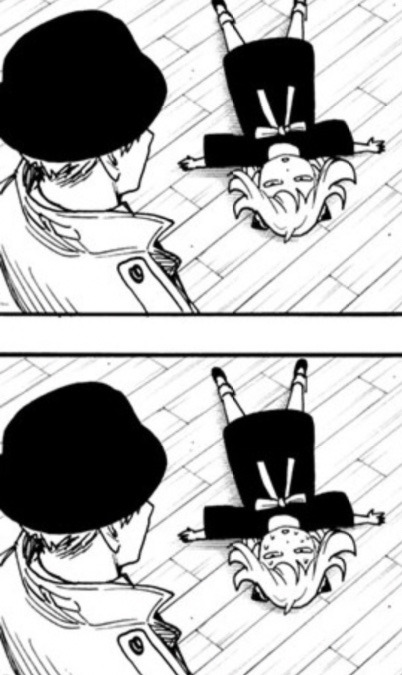
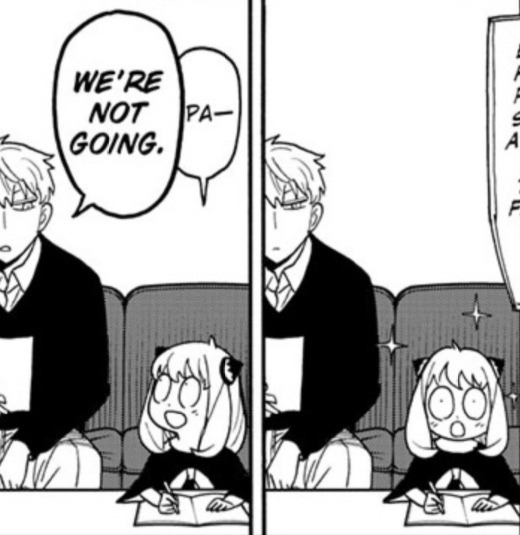
twiyor is cute but the relationship between loid and anya is SO funny and real
#i try not to discuss manga spoilers too much on my blog because i know some of my followers are anime only#but these panels made me howl#spy x family#sxf#loid forger#yor forger#spyxfamily#anya forger#spy x family manga
2K notes
·
View notes
Text
** the last two options exist because I know there will be great debate about which Three Days Grace/Linkin Park song should be on here
#polls#discussion#for me it's absolutely Every time we touch and animal I have become#hands down#also if you watched Kingdom Hearts or Final Fantasy AMVs there's a strong chance you saw my youtube channel at some point if it was pre2011#I had a bunch of videos with a few thousand views a piece :)#I did naruto later on too but kh/ff was more niche
2K notes
·
View notes
Text
it is completely understandable to be uncomfortable with the sexual assault in dandadan. it's important to discuss how it's framed, whether it's handled poorly, or if it could be been portrayed better. but the number of people - even fans - stating that it is only fanservice, irrelevant, or could be removed is frankly bizarre to for SO many reasons, starting with the fact that this parallel exists.
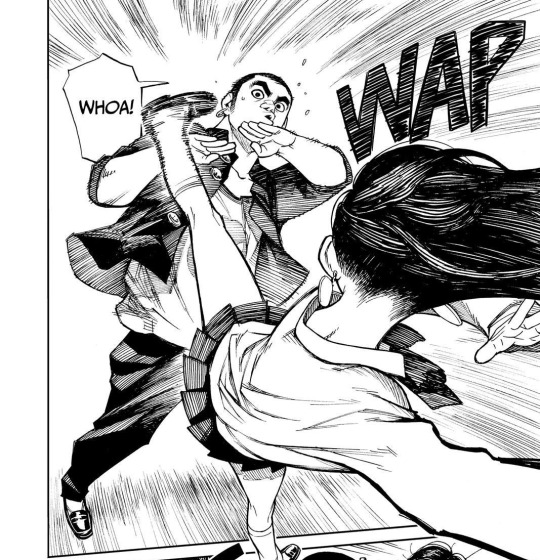
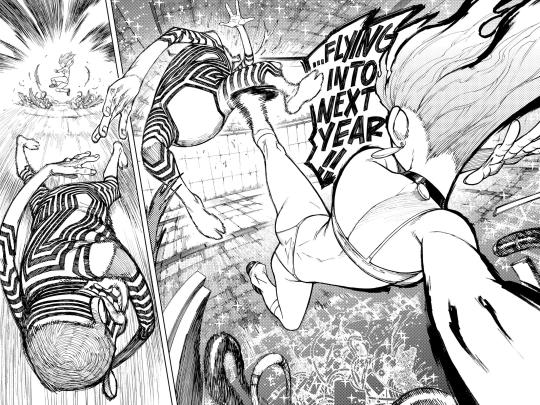
the anime made it even more obvious by interpolating cuts from the first scene into the second one.


i thought this scene showed that momo gaining her powers by believing in her relationship with her grandmother gives her the strength to fight back against what is basically a horrific, much more aggressive and abstract (maybe even absurd?) representation of her shitty gross ex - who was demanding she 'put out' and pay for the love hotel in very first scene.
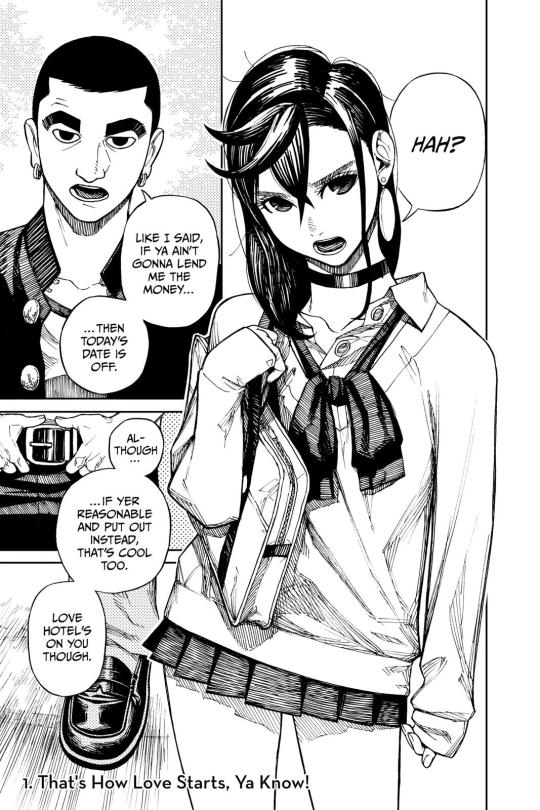
while the escalation from one scene to the next is surprising, it's not something that comes out of nowhere. this first scene is meant to be a set-up to what will happen later. it sets the tone, though significantly more lighthearted at this point. it tells you that sex, sexuality, etc. is something dandadan will touch on - though you don't know what the scope and depth will be until later in the chapter.
i cannot recommend this video enough, as it discusses some interesting interpretations of what the serpoians and turbo granny represent in their respective assault scenes, as well as how right now the treatment of both scenes is unfortunately uneven.
more notes about plot and thematic relevance below the cut. spoilers for anime-onlies (up to chapter 8, will probably be covered in episodes 4/5).

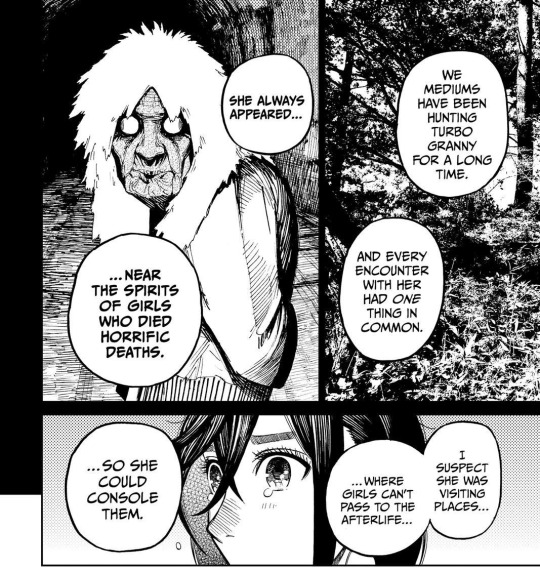
momo was assaulted, and almost cut up by the serpoians, much like the other victims turbo granny appeared around. this is an intentional parallel. turbo granny goes to momo because that is what she does. again, SUPER unclear how that factors into turbo granny's assault of ken, but if we keep the video's interpretation of cynicism in mind, it could be related to that; maybe turbo granny has a cynicism toward men - similar to momo in chapter/episode 1 - and this is why she chose to attack ken. unfortunately, it's still too early to really understand and explain a lot of her motivations.
again, completely understandable to not like how the sexual assault was handled or portrayed, and it's important to keep discussing it. but this is what dandadan does for many different types of trauma and difficult life experiences. this is a huge part of dandadan's identity. if you don't like it, that is fine, but calling the sexual assault 'just fan service' is blatantly untrue.
#dandadan#L.txt#long post#dandadan analysis#< i guess? 😭#discussdadan#sorry for this kinda sloppy post but i need it out bc i feel like im losing my mind#this is not even ''''''''''a defense''''''''''' of the s/a i think it's really important to discuss framing/handling/etc etc#but some of the discourse arising from the first episode is maddening and is thoroughly not helped by ppl being weird/assholes abt it#you dont ''''''have to like it'''''' (< what does that even mean??) or keep reading it or literally anything#this is just a basic 'please engage w the text'
955 notes
·
View notes
Text
Social anxiety level: Chatting with someone experiencing a schizophrenic episode and becoming increasingly self-concious of how I'm just saying "That sounds really stressful", "I've never heard of that but it sounds scary", and "You must be pretty worried about that" over and over again
#They needed someone to wait with them while their friend came to pick them up#And the whole time I was waiting for them to call bullshit#Like YOU HAVENT SAID ANYTHING MEANINGFUL YOURE SO BAD AT THIS#I'm sorry I'm making this one about me ma'am I'm just terrified that everyone I talk to is gonna give be a bad grade#I don't understand or beleive most of what you're saying but from the legit science you're quoting I can tell you've done some research#The research stuff I appreciate we can totally talk about that#Please God let me talk about Chordata or HTML instead of the thing I can't see or hear wouthout encouraging your delusion#I'd get SUCH a good grade at discussing invertebrates with you
1K notes
·
View notes
Text

Flower Empowered.
[First] Prev <–-> Next
#poorly drawn mdzs#mdzs#lan wangji#wei wuxian#lan wunian#The absolute chaos that ensued when Lan Wangji showed up...those girls went wild.#We have to give kudos to narration that takes the form of a bunch of suitor seeking ladies.#They were so loud about being here for the hotties and whispering gossip. You go girls.#Wei Wuxian most likely just picked up a already tossed flower to throw. Second hand flowers...are still flowers I suppose.#Can you imagine if LWJ had allergies? Poor lad.#Okay it's time for the real gritty discussion point. The one everyone is waiting for me to talk about:#So...from where we are in the timeline...what the hell is WWX supposed to be wearing?#I'm serious. Put all the fanart out of your brain for a moment.#We are post burial grounds and sunshot campaign so he's had his little goth moment reveal.#*BUT* he is still with the Jiang sect. And by proxy of this flashback talking about his disrespect - they never bring up his attire.#meaning he is likely in some kind of Jiang Purple.#Continuity wise it really feels like this scene should have been *before* the burial mounds.#I understand why it's post - we need to build up on the mystery of how he became the YLLZ.#But also his personality feels way more 'pre-burial mounds WWX'. I think this was probably a 'I don't want to kill my darling' scene.#(The Phoenix mountain flashback is a lot of people's 'darling'. I am knowingly putting myself in the line of fire here).#I'm willingly putting him in Wen Qing's borrowed cloak and assuming people take him wearing it as like...a war trophy.#Historians will revise this moment later on but for now he *is* a hero of that war.
1K notes
·
View notes
Text

Mandragora Arknights good ending
She got got better as a person and also physically :)
#I don't remember exactly what discussion led to this#but the discussion ended with us concluding that Mandragora would be fixed if she had a beer a blunt and some time to chill#And therapy#Also wanted to give her a cane :3 I feel like she might have some sort of disability after... That#To those wondering about the poll: I HAVEN'T FORGOTTEN!#it's just been a busy month so I'm posting backlog and doing smaller pieces and finishing comms#Weedknights#Weedknights Piece 1/?#Featuring Modelo#Arknights#Pixel art#Mandragora#pixel#digital art#artists on tumblr#art
1K notes
·
View notes
Text
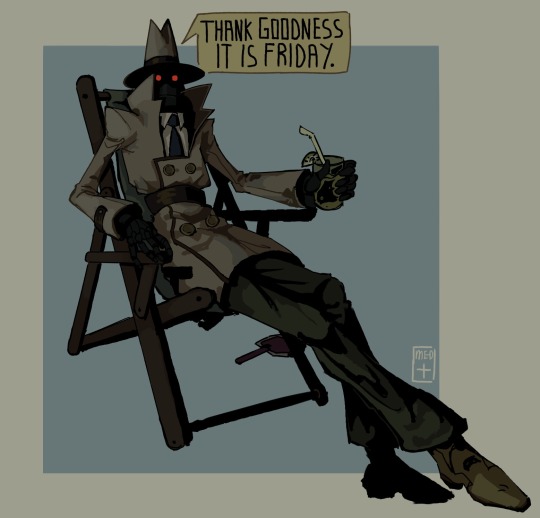
ohhh hell yes
#psychonauts#g-men#trainofthought#pls ignore the hand i know its kind of ass i dont care 🏃🏃🏃🏃#i drew this like 2 days ago but i just had to post it on a friday or it would be wrong#sometimes i draw shoes really good and this is one of these times for some reasob#i fucking love drawing these thingd#wait like do the g-men actually get the weekend off or.:.??????#i dojt care. i think they shpuld be allowed a day off (they will discuss their theories and like. play board games. but really boring ones)
5K notes
·
View notes